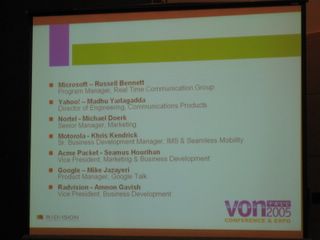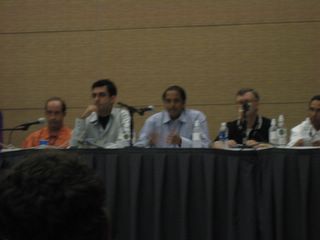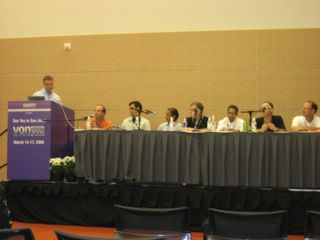Friday, September 30, 2005
Mobicents EclipSLEE 1.0 Beta 1 Released!
This is the first public binary release of the Open Source SLEE tool. It allows rapid creation, development and deployment of SLEE services. Read the Getting Started Guide and try it out.
State of the IP Convergence
Indu Kodukula has an interesting presentation posted on the BEA World site. The title is "WebLogic Communication Platform Overview". It actually has good highlights on the IP Convergence market itself. For example it says that the largest consumer VoIP operator in the US is built completely on the Web Logic SIP Server (hint: Vonage?). Overall 30% of the US operators are ready to do a one time sweep migration to IP Communications. This is pretty significant number in terms of market size.
70% of the US telco operators are not ready to dump their investments in legacy Intelligent Networks. The percentage in Europe is even higher. Most operators need a platform that will allow them to integrate legacy stacks such as SS7 with IP protocols like SIP.
This further helps explain the positioning of SIP Servlets vs JSLEE. The former standard is the right choice for the operators that are ready to make the sudden switch, while JSLEE will be important for heterogenous environments.
Another bit of interesting information in the presentation is that Web Logic SIP Server 2.0 does not have Session Replication and Clustering implemented yet. These features are scheduled for a new release later this year.
I can't help to mention that Mobicents already has clustering capabilities and demonstrated SIP failover at VON last week.
70% of the US telco operators are not ready to dump their investments in legacy Intelligent Networks. The percentage in Europe is even higher. Most operators need a platform that will allow them to integrate legacy stacks such as SS7 with IP protocols like SIP.
This further helps explain the positioning of SIP Servlets vs JSLEE. The former standard is the right choice for the operators that are ready to make the sudden switch, while JSLEE will be important for heterogenous environments.
Another bit of interesting information in the presentation is that Web Logic SIP Server 2.0 does not have Session Replication and Clustering implemented yet. These features are scheduled for a new release later this year.
I can't help to mention that Mobicents already has clustering capabilities and demonstrated SIP failover at VON last week.
Thursday, September 29, 2005
BEA World: Next Gen Communications in the spotlight
BEA continues to charge ahead with an aggressive IP Communications program. It has been a leading revenue source over the last few quarters. At BEA World, the company hosts a number of Communications related sessions. Many of them are available for download for free.
Monday, September 26, 2005
Mobicents presentation at VON Fall 2005
Check out the presentation that Ranga, Francesco, Phelim and I did at VON Fall 2005 in Boston.
Go to download page.
Go to download page.
Sunday, September 25, 2005
Bridging the Islands - Yahoo Messenger, MSN Messenger, Google Talk; VON Fall 2005
There was an interesting and provocative panel session at VON. Representatives from Yahoo, Google, Microsoft, Nortel and Radvision talked about the value of open standards and interoperability. Each one of them acknoledged the importance and value of communications standards such as SIP and IMS.
I took away two important comments from the discussion:
1) Standards are just the tip of the iceberg. Implementing the specifications and ensuring interoperability between implementations is far more involving and typically takes 3-4 years after the standards are published. This poses a big challange to next generation telcos. In a fast paced world, 3-4 years is an enormous amount of time. There is a chance that more agile alternatives will emerge and gain market share. Asterisk and Skype are already making this point.
The morale of the story for me is that Open Standards supporters should share resources and extend their collaboration beyond specifications into implementation. Open Standards + Open Source implementations seems to make a lot of sense. It ensures low cost, fast paced creation of a unified platforms that a large network of providers can benefit from. It cuts the costs of duplicated development and interoperability testing.
2) While Yahoo, Google and MS talked about the value of interconnected networks, they did not answer very well my SIMPLE question, which was: "When are we going to be able to send a SIMPLE message from MSN Messenger to Yahoo Messenger to Google Talk?".
Russell Bennett at Microsoft said that they supported SIP and SIMPLE since 2001 and are ready to interop with Google as soon as Google is ready. Mike Jazayeri at Google said that they are ready to interop with Microsoft as soon as Microsoft invites them. Madhu Yarlagadda said that Yahoo Messenger 7 supports SIP and they are currently piloting a bridge with MSN. Fingers crossed for the pilot to come through.
I talked to Madhu after the session and he told me that they are working on a program to allow service providers to test connectivity with Yahoo Messenger servers. Mike told me the same about Google Talk. Hopefully the Mobicents community will soon obtain access to try out SLEE services for the two major communications networks.
Here are some pictures from the session:



I took away two important comments from the discussion:
1) Standards are just the tip of the iceberg. Implementing the specifications and ensuring interoperability between implementations is far more involving and typically takes 3-4 years after the standards are published. This poses a big challange to next generation telcos. In a fast paced world, 3-4 years is an enormous amount of time. There is a chance that more agile alternatives will emerge and gain market share. Asterisk and Skype are already making this point.
The morale of the story for me is that Open Standards supporters should share resources and extend their collaboration beyond specifications into implementation. Open Standards + Open Source implementations seems to make a lot of sense. It ensures low cost, fast paced creation of a unified platforms that a large network of providers can benefit from. It cuts the costs of duplicated development and interoperability testing.
2) While Yahoo, Google and MS talked about the value of interconnected networks, they did not answer very well my SIMPLE question, which was: "When are we going to be able to send a SIMPLE message from MSN Messenger to Yahoo Messenger to Google Talk?".
Russell Bennett at Microsoft said that they supported SIP and SIMPLE since 2001 and are ready to interop with Google as soon as Google is ready. Mike Jazayeri at Google said that they are ready to interop with Microsoft as soon as Microsoft invites them. Madhu Yarlagadda said that Yahoo Messenger 7 supports SIP and they are currently piloting a bridge with MSN. Fingers crossed for the pilot to come through.
I talked to Madhu after the session and he told me that they are working on a program to allow service providers to test connectivity with Yahoo Messenger servers. Mike told me the same about Google Talk. Hopefully the Mobicents community will soon obtain access to try out SLEE services for the two major communications networks.
Here are some pictures from the session:



Saturday, September 24, 2005
VON was a blast
We had exceptionally exciting days at VON. Ranga and I were approached by a number of industry players who expressed their support of the Mobicents project. This is the kind of recognition that keeps us going.
Our presentation went great. We had a small audience of experts who knew what Mobicents was and had specific technical questions. What really impressed me was that all 3 demos showed on 3 different laptops worked smoothly. The High Availability demo for SIP mid-call and registrar failover, the EclipSLEE built Wake Up service and the WiFi SIP hand held phone from ZyXel all clicked nicely. That was a surprise to me, because I usually get caught by the demo syndrom and nothing works in front of an audience :).
While we were having fun at VON, the folks at Lucent did amazing work tuning the SIP RA and the SLEE engine. Leondo reported new performance peak of sustained 50cps!!! This puts us only half way from the "unreacheable" carrier grade 100cps! The folks that are tracking the project are probably as shocked as I am that we managed to get from 1 to 50cps in 2 months. Not bad.
I am done packaging the new beta release and will make the announcement later today.
Our presentation went great. We had a small audience of experts who knew what Mobicents was and had specific technical questions. What really impressed me was that all 3 demos showed on 3 different laptops worked smoothly. The High Availability demo for SIP mid-call and registrar failover, the EclipSLEE built Wake Up service and the WiFi SIP hand held phone from ZyXel all clicked nicely. That was a surprise to me, because I usually get caught by the demo syndrom and nothing works in front of an audience :).
While we were having fun at VON, the folks at Lucent did amazing work tuning the SIP RA and the SLEE engine. Leondo reported new performance peak of sustained 50cps!!! This puts us only half way from the "unreacheable" carrier grade 100cps! The folks that are tracking the project are probably as shocked as I am that we managed to get from 1 to 50cps in 2 months. Not bad.
I am done packaging the new beta release and will make the announcement later today.
Thursday, September 15, 2005
Microsoft Responds to Google Talk?
I don't think so. There is no mention of open standards support in the new MSN Messenger 7.5. Windows Messenger 5.1 is still the latest known MS client that openly supports SIP. I am sticking to it for the time being.
Tuesday, September 13, 2005
eBay acquires Skype
This is all over the technology and business news. It's been a while since tech companies were valued at 70 times their revenue. VoIP is not all talk any more.
Saturday, September 03, 2005
Microsoft Acquires VoIP Startup Teleo
Microsoft won't let Yahoo and Google ride the VoIP PR buzz by themselves. Teleo isn't nearly as popular as DialPad, and they haven't even released a product. Plus Windows Messenger was already a decent SIP client with a good IM user base. But hey, you've got to trust this is money well spent.
Subscribe to:
Comments (Atom)